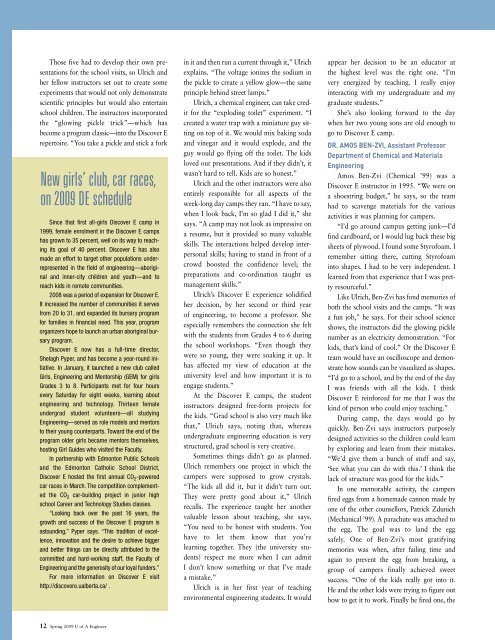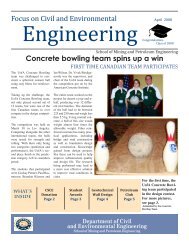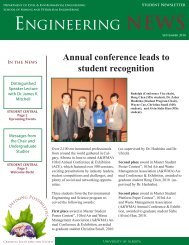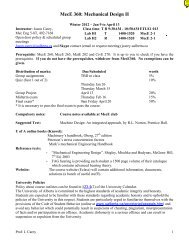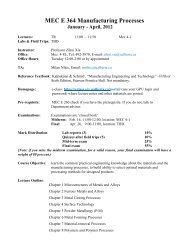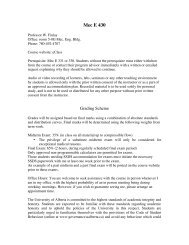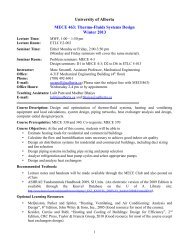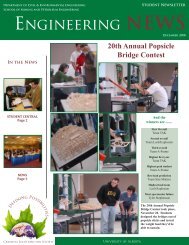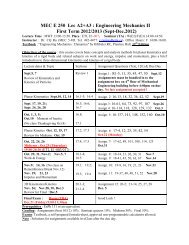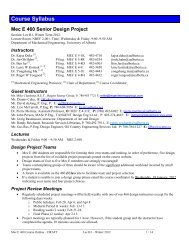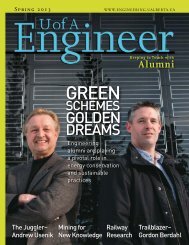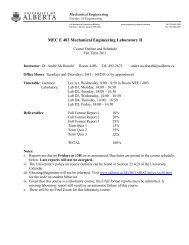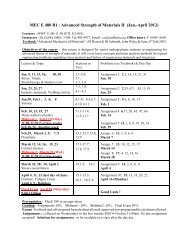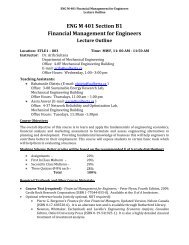Download - Faculty of Engineering - University of Alberta
Download - Faculty of Engineering - University of Alberta
Download - Faculty of Engineering - University of Alberta
Create successful ePaper yourself
Turn your PDF publications into a flip-book with our unique Google optimized e-Paper software.
Those five had to develop their own presentations<br />
for the school visits, so Ulrich and<br />
her fellow instructors set out to create some<br />
experiments that would not only demonstrate<br />
scientific principles but would also entertain<br />
school children. The instructors incorporated<br />
the “glowing pickle trick”—which has<br />
become a program classic—into the Discover E<br />
repertoire. “You take a pickle and stick a fork<br />
New girls’ club, car races,<br />
on 2009 DE schedule<br />
Since that first all-girls Discover E camp in<br />
1999, female enrolment in the Discover E camps<br />
has grown to 35 percent, well on its way to reaching<br />
its goal <strong>of</strong> 40 percent. Discover E has also<br />
made an effort to target other populations underrepresented<br />
in the field <strong>of</strong> engineering—aboriginal<br />
and inner-city children and youth—and to<br />
reach kids in remote communities.<br />
2008 was a period <strong>of</strong> expansion for Discover E.<br />
It increased the number <strong>of</strong> communities it serves<br />
from 20 to 31, and expanded its bursary program<br />
for families in financial need. This year, program<br />
organizers hope to launch an urban aboriginal bursary<br />
program.<br />
Discover E now has a full-time director,<br />
Shelagh Pyper, and has become a year-round initiative.<br />
In January, it launched a new club called<br />
Girls, <strong>Engineering</strong> and Mentorship (GEM) for girls<br />
Grades 3 to 8. Participants met for four hours<br />
every Saturday for eight weeks, learning about<br />
engineering and technology. Thirteen female<br />
undergrad student volunteers—all studying<br />
<strong>Engineering</strong>—served as role models and mentors<br />
to their young counterparts. Toward the end <strong>of</strong> the<br />
program older girls became mentors themselves,<br />
hosting Girl Guides who visited the <strong>Faculty</strong>.<br />
In partnership with Edmonton Public Schools<br />
and the Edmonton Catholic School District,<br />
Discover E hosted the first annual CO 2-powered<br />
car races in March. The competition complemented<br />
the CO 2 car-building project in junior high<br />
school Career and Technology Studies classes.<br />
“Looking back over the past 16 years, the<br />
growth and success <strong>of</strong> the Discover E program is<br />
astounding,” Pyper says. “This tradition <strong>of</strong> excellence,<br />
innovation and the desire to achieve bigger<br />
and better things can be directly attributed to the<br />
committed and hard-working staff, the <strong>Faculty</strong> <strong>of</strong><br />
<strong>Engineering</strong> and the generosity <strong>of</strong> our loyal funders.”<br />
For more information on Discover E visit<br />
http://discovere.ualberta.ca/ .<br />
12 Spring 2009 U <strong>of</strong> A Engineer<br />
in it and then run a current through it,” Ulrich<br />
explains. “The voltage ionizes the sodium in<br />
the pickle to create a yellow glow—the same<br />
principle behind street lamps.”<br />
Ulrich, a chemical engineer, can take credit<br />
for the “exploding toilet” experiment. “I<br />
created a water trap with a miniature guy sitting<br />
on top <strong>of</strong> it. We would mix baking soda<br />
and vinegar and it would explode, and the<br />
guy would go flying <strong>of</strong>f the toilet. The kids<br />
loved our presentations. And if they didn’t, it<br />
wasn’t hard to tell. Kids are so honest.”<br />
Ulrich and the other instructors were also<br />
entirely responsible for all aspects <strong>of</strong> the<br />
week-long day camps they ran. “I have to say,<br />
when I look back, I’m so glad I did it,” she<br />
says. “A camp may not look as impressive on<br />
a resume, but it provided so many valuable<br />
skills. The interactions helped develop interpersonal<br />
skills; having to stand in front <strong>of</strong> a<br />
crowd boosted the confidence level; the<br />
preparations and co-ordination taught us<br />
management skills.”<br />
Ulrich’s Discover E experience solidified<br />
her decision, by her second or third year<br />
<strong>of</strong> engineering, to become a pr<strong>of</strong>essor. She<br />
especially remembers the connection she felt<br />
with the students from Grades 4 to 6 during<br />
the school workshops. “Even though they<br />
were so young, they were soaking it up. It<br />
has affected my view <strong>of</strong> education at the<br />
university level and how important it is to<br />
engage students.”<br />
At the Discover E camps, the student<br />
instructors designed free-form projects for<br />
the kids. “Grad school is also very much like<br />
that,” Ulrich says, noting that, whereas<br />
undergraduate engineering education is very<br />
structured, grad school is very creative.<br />
Sometimes things didn’t go as planned.<br />
Ulrich remembers one project in which the<br />
campers were supposed to grow crystals.<br />
“The kids all did it, but it didn’t turn out.<br />
They were pretty good about it,” Ulrich<br />
recalls. The experience taught her another<br />
valuable lesson about teaching, she says.<br />
“You need to be honest with students. You<br />
have to let them know that you’re<br />
learning together. They (the university students)<br />
respect me more when I can admit<br />
I don’t know something or that I’ve made<br />
a mistake.”<br />
Ulrich is in her first year <strong>of</strong> teaching<br />
environmental engineering students. It would<br />
appear her decision to be an educator at<br />
the highest level was the right one. “I’m<br />
very energized by teaching. I really enjoy<br />
interacting with my undergraduate and my<br />
graduate students.”<br />
She’s also looking forward to the day<br />
when her two young sons are old enough to<br />
go to Discover E camp.<br />
DR. AMOS BEN-ZVI, Assistant Pr<strong>of</strong>essor<br />
Department <strong>of</strong> Chemical and Materials<br />
<strong>Engineering</strong><br />
Amos Ben-Zvi (Chemical ’99) was a<br />
Discover E instructor in 1995. “We were on<br />
a shoestring budget,” he says, so the team<br />
had to scavenge materials for the various<br />
activities it was planning for campers.<br />
“I’d go around campus getting junk—I’d<br />
find cardboard, or I would lug back these big<br />
sheets <strong>of</strong> plywood. I found some Styr<strong>of</strong>oam. I<br />
remember sitting there, cutting Styr<strong>of</strong>oam<br />
into shapes. I had to be very independent. I<br />
learned from that experience that I was pretty<br />
resourceful.”<br />
Like Ulrich, Ben-Zvi has fond memories <strong>of</strong><br />
both the school visits and the camps. “It was<br />
a fun job,” he says. For their school science<br />
shows, the instructors did the glowing pickle<br />
number as an electricity demonstration. “For<br />
kids, that’s kind <strong>of</strong> cool.” Or the Discover E<br />
team would have an oscilloscope and demonstrate<br />
how sounds can be visualized as shapes.<br />
“I’d go to a school, and by the end <strong>of</strong> the day<br />
I was friends with all the kids. I think<br />
Discover E reinforced for me that I was the<br />
kind <strong>of</strong> person who could enjoy teaching.”<br />
During camp, the days would go by<br />
quickly. Ben-Zvi says instructors purposely<br />
designed activities so the children could learn<br />
by exploring and learn from their mistakes.<br />
“We’d give them a bunch <strong>of</strong> stuff and say,<br />
‘See what you can do with this.’ I think the<br />
lack <strong>of</strong> structure was good for the kids.”<br />
In one memorable activity, the campers<br />
fired eggs from a homemade cannon made by<br />
one <strong>of</strong> the other counsellors, Patrick Zdunich<br />
(Mechanical ’99). A parachute was attached to<br />
the egg. The goal was to land the egg<br />
safely. One <strong>of</strong> Ben-Zvi’s most gratifying<br />
memories was when, after failing time and<br />
again to prevent the egg from breaking, a<br />
group <strong>of</strong> campers finally achieved sweet<br />
success. “One <strong>of</strong> the kids really got into it.<br />
He and the other kids were trying to figure out<br />
how to get it to work. Finally he fired one, the


